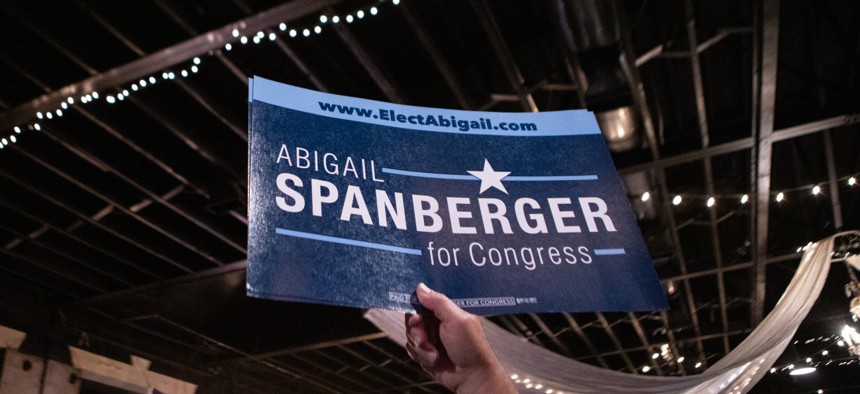
Supporters of Rep. Abigail Spanberger, D-Va., celebrate her victory during an election night event. Anna Rose Layden / Stringer Getty Images
Supporters of Better Pay and Benefits for Feds Win Re-election
A roundup of pay and benefits news.
While the broader implications of the midterm election results for policies that affect the civil service might remain unknown for some time, federal employee supporters won several key, competitive races. This could be good news for pay and benefits.
Democratic Rep. Abigail Spanberger won her bid for Virginia’s 7th congressional district in a race that was considered one of the tightest in the country. Spanberger, a former CIA employee, in 2019 used her first address from the House floor to highlight the plight of federal employees during the government shutdown. Her first bill was to ensure back pay for federal workers.
Rep. Jennifer Wexton, D-Va., also won re-election. She helped usher paid parental leave for feds into law and calls herself “a leader in fighting for pay raises for our tireless federal workers.” She has pushed for more oversight of agency relocations, for increased telework and for increased child care benefits.
Spanberger, Wexton and other backers of federal employees may have to fend off proposed cuts to federal pay and benefits, in what looks likely to be a divided government for the first time during the Biden administration. Stay tuned for more coverage of election results and what they may mean for the federal workforce.
Lawmakers Float More Tweaks to Public Service Loan Forgiveness
As the Biden administration moves forward with a series of regulatory changes aimed at making the popular Public Service Loan Forgiveness Program easier for borrowers to use, some lawmakers in Congress are proposing legislation to restructure the program so that more public servants can participate, faster.
Last week marked the expiration of a series of temporary waivers that made the program, which offers student debt forgiveness to recent graduates who spend at least 10 years working in government or at a qualifying nonprofit organization while making regular payments, easier to navigate. But many of the provisions of those temporary fixes will permanently become part of the program next July.
The recent focus on the program has prompted some House Democrats to rethink how it should work. Reps. Jim Clyburn, D-S.C., and Brendan Boyle, D-Pa., recently introduced the Public Service Reward Act (H.R. 9097), which would make it so that, instead of receiving total forgiveness after 10 years of service, applicants for the benefit would receive a chunk of loan forgiveness for each year’s worth of consecutive loan payments.
The bill also would expand which loans would qualify for forgiveness, to include Federal Family Education Loans, Perkins Loans, direct consolidation loans and Parent Plus Loans, in addition to the direct loans that already are included in the program. Consolidating debt into a single loan also would no longer reset borrowers’ clocks for the purpose of pursuing forgiveness.
Uneven Implementation of Biden's Updated Voting Leave Policies
One of the Biden administration’s earlier initiatives to improve the working conditions of federal employees and encourage participation in elections was expanding paid leave for federal workers to vote or to volunteer at a polling station. But recent Government Executive reports revealed that some agencies have been slow to actually implement the new benefit, while others have placed severe restrictions on the practice.
Some agencies have justified their placing of guard rails on providing feds up to four hours of leave to vote, and up to eight hours to serve as election judges, by citing their need to ensure adequate staffing and meet other operational needs on Election Day.
Others have simply ignored Biden’s executive order, or have insisted they are still studying how to implement the policy. A union representing U.S. Army Corps of Engineers employees in the Chicago area filed an unfair labor practice complaint against management at the agency over its inaction.
Union officials expressed frustration that, nearly 20 months after Biden’s order was enacted, and eight months after the Office of Personnel Management issued guidance to help agencies implement the directive, the Defense Department instructed its component agencies to follow the old voting leave policy, which dates back to 2015. They said the move marks a pattern, in which management “slow walks” some workforce policies but not others.
Eric Katz contributed to this column.







